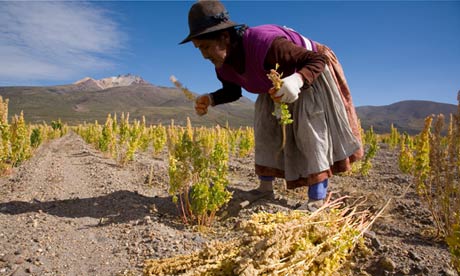The mythology of the frontier, from colonial times to the eve of the Civil War.
When you wipe away the blood and the anarchic humor, what you see in “Django Unchained” is moral disgust with slavery, instinctive sympathy for the underdog and an affirmation (in the relationship between Django and Schultz) of what used to be called brotherhood.
Saturday, January 19, 2013
Democracy controlled by millionaires and billionaires
As Billion-Dollar Democracy shows, 32 multi-million dollar gifts outweighed the collective voice of 3.7 million individuals who gave individual and transparent campaign contributions to the candidate of their choice. Moreover, most did so under a veil of secrecy using shadow non-profit groups and shell corporations created specifically to launder political giving by masking the identities of financial sources.


Quinoa, asparagus, North-South exchange
The quinoa trade is yet another troubling example of a damaging north-south exchange, with well-intentioned health and ethics-led consumers here unwittingly driving poverty there. It's beginning to look like a cautionary tale of how a focus on exporting premium foods can damage the producer country's food security. Feeding our apparently insatiable 365-day-a-year hunger for this luxury vegetable, Peru has also cornered the world market in asparagus. Result? In the arid Ica region where Peruvian asparagus production is concentrated, this thirsty export vegetable has depleted the water resources on which local people depend. NGOs report that asparagus labourers toil in sub-standard conditions and cannot afford to feed their children while fat cat exporters and foreign supermarkets cream off the profits. That's the pedigree of all those bunches of pricy spears on supermarket shelves.


Tuesday, January 15, 2013
Saturday, January 12, 2013
Wednesday, January 9, 2013
Monday, January 7, 2013
Subscribe to:
Posts (Atom)

